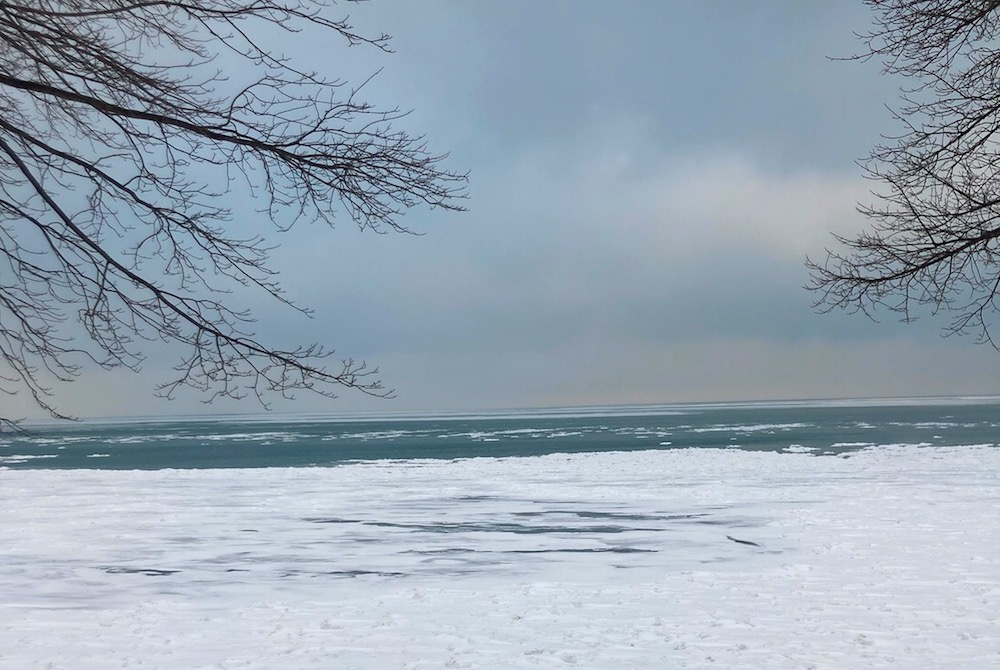
Lake Erie in the wintertime, from near the retreat house where I have been going annually since entering the community (Jennifer Wilson)
A curious student asked, "Sister, what you are doing over winter break?" The room erupted into giggles and questions. I stood there confused for a second, wondering what I said that caused this reaction. I looked out at the giggling teens and it dawned on me. I had just said I was going on silent retreat.
Sometimes I forget how curious people are about this mysterious silent retreat I go on. People ask a lot of questions about this. The first question is usually something like, Wait, how are you silent for a whole week? I am not by nature a quiet person. The next is usually something like, What exactly do you do?
It is difficult to explain silent retreat to a generation of students that protest giving up their phones when we have retreats at school. In Brigid Schulte's book Overwhelmed: How to Work, Love, and Pray When No One Has the Time, she cites a study involving 700 people and 11 different experiments that discovered that the majority of the people in the study found it uncomfortable to be alone in a room with their thoughts for just 6 to 15 minutes. No wonder people are curious and at times flabbergasted over the idea of silent retreat.
I have been going on this yearly retreat since I entered the Sisters of Mercy. Fifteen years of the same yearly practice, and it has become my favorite week of the whole year. I recognize that it is a privilege to have resources and time allotted to this week. A whole week to myself to pray, to write, and to just be.
Advertisement
In the silence God is always there, and I have come to trust that whatever ways God is present is exactly what is supposed to happen or not happen during the week. The first several years of participating in retreat, I struggled with the silence. The silence brought vulnerability from which I could not run away, and turning to God was the obvious choice. Now that I trust and delight in that week away with God, the question becomes: What about the rest of the time?
My colleagues at the school where I teach seem to be exhausted from this past year. I hear people ask, "When are we going to get back to normal?" A year ago, most of us traded the frenzy of travel, in-person meetings, children's activities and gatherings for Zoom calls. I traded one frenzied pace for another. I am not energized by the endless Zoom calls that often feel more like obligation than connection. People wonder when we will go back to normal, and I wonder what "normal" even means anymore.
I know that I am not alone in this wondering. This past year has left me feeling like I have been swimming against the current as things change constantly. My daily life before the pandemic was busy and at times chaotic. It was, however, what I had created. This year has given way to the question: Do I want that old life back? I am beginning to imagine my life after the pandemic as a merging of both worlds, of some things from before and some things different. Do any of us really want to go back to our frenzied busy lives without time and space to just be? My whole life cannot be the peace and tranquility that silent retreat brings, but I think my life can have pieces of retreat woven into it.
While on retreat, I read Terry Hersey's book Sanctuary, and it helped me to think of ways forward. Hershey says, "Sanctuary is a dose of grace. Sanctuary space bestows upon us gifts: stillness, gladness, calm, mystery, delight, and peacefulness. It's not easy for most of us to take grace as our starting point. When it comes to personal or spiritual growth, we often spend our energy chasing or anticipating. But sanctuary begins when we stop and embrace what is already here, when we receive what has already been bestowed on us."

What can you do create quiet and space in your everyday? (Jennifer Wilson)
I have been reflecting on these words and thinking about ways to embrace moments of quiet in the middle of life as it unfolds into what it will become. The grace for me seems to be that although I cannot control all of what happens right now and into the post-pandemic time that is emerging, I can use the moments I do have in my day to create sanctuary space that makes room for quiet — for time to just be. The secret for me is to not make it too big; then I spend more time thinking about what I am going to do than actually doing it.
I need to take sanctuary moments a couple of times throughout the day to keep me centered and feeling like I am not rushed all the time. A 20-minute run where there is nothing but me and my thoughts; a brief practice of yoga, 15 minutes of sitting and doing nothing. At the end of the day, I ask myself, What made me smile today?
In these two weeks since recommitting to this sanctuary time, I have found that I usually answer that question with something that I did that gave me that quiet, time and space to just be. My question to you is: What can you do create quiet and space in your everyday?






